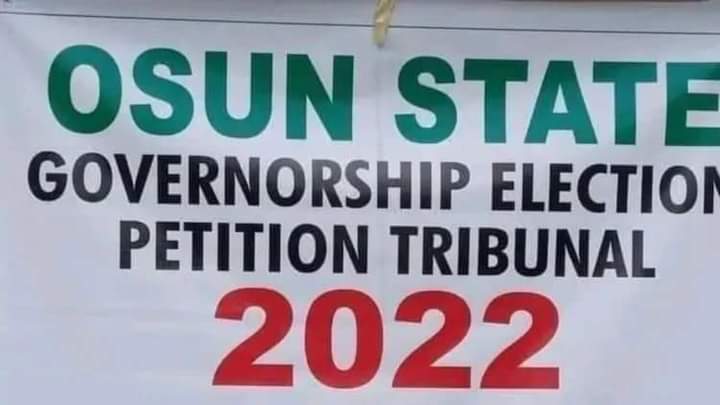- Dissenting Views And Grounds Of Appeal
- Matters Arising
Ismaeel Uthman
THE election petition tribunal on the July 16, 2022 governorship election in the State of Osun, on Friday, January 27, 2023 ruled in favour of the All Progressives Congress (APC) and former governor Adegboyega Oyetola.
APC and Oyetola had approached the tribunal with two major complaints; that Sen. Ademola Adeleke who was declared winner of the election was not qualified to contest and that the number of votes recorded for him were inflated in 749 polling units across 10 local governments.
The affected local governments are: Ede North (101 polling units); Ede South (19 polling units); Egbedore (55 polling units); Ejigbo (58 polling units); lla (56 polling units): llesa West (67 polling units); Irepodun (48 polling units); Obokun (36 polling units); Olorunda (103 polling units); and Osogbo (147 polling units).
According to APC, there was over voting even at Unit 9, Ward 2, Abogunde Sagba, Ede North Local Government, where Governor Adeleke voted on the election day.
But the PDP and Adeleke raised objections to the petitions, asking the court to dismiss it for lack of merit. Adeleke insisted that he was qualified to contest the election and also scored the majority of valid votes cast on the election day.
However, a Statistician and Forensic Examiner, Mr. Samuel Oduntan, who testified on behalf of Governor Adeleke admitted before the tribunal that over voting took place only in six polling units as against the 749 disputed polling units.
Oduntan said over voting took place at Obokun (two polling units), Egbedore (two polling units), Osogbo (one polling unit) and Olorunda (one polling unit).
After the final addressed of all the parties, two of the tribunal judges, Justice T.A Kume and Justice Rabi Bashir, upheld the claim of the petitioners that there was over voting in 744 polling units based on the evidence before the court.
According to reports, the total number of votes cast at the polling units were more than the accredited voters with 10,154.
“In other words, the defences of the Respondents are plagued with fundamental mortal flaws highly irreconcilable and unreliable, incapable of defeating the credible evidence tendered by the Petitioners in respect of the 744 Polling Units were over-voting has been established.
“The inference, we hereby draw from the facts established by the evidence on record is that, the election conducted on the 16th day of July, 2022 was done in substantial non-compliance with the provisions of the Electoral Act (Supra), and the extant regulations made thereunder,” said the judges.
Subsequently the tribunal deducted the “invalid votes” which amounted to 112,705 from 403,371 as declared by the Independent National Electoral Commission (INEC) for Adeleke.
The deduction reduced Adeleke’s votes to 290,666.
Also, a total of 60,096 “invalid votes” were removed from 375,027 recorded for Oyetola by INEC.
As a result, Oyetola votes reduced to 314,931, leading Adeleke with 24,265.
The tribunal thereafter declared Oyetola as the validly elected governor having won majority of valid votes in the July 16 governorship election.
This is just as the tribunal submitted that Adeleke was qualified to contest the election.
Contrary to the claim that Bashir did not sign the majority judgment, OSUN DEFENDER noted that the judge appended her signature to the 107-page verdict.
However, a dissenting judgement delivered by Justice B. A Ogbuli, upheld Adeleke’s victory based on the ground that the APC and Oyetola did not satisfactorily prove their case of over-voting against Adeleke’s victory.
According to Justice Ogbuli, the petitioners failed to attach the voters register of each of the polling units to the evidence supplied in arguing their case, a development he said made their petition very weak.
The total number of registered voters at the 744 polling units where over voting allegedly occurred was put at 172,801.
Justice Ogbuli held that: “I hold that Register of voters is still relevant even though more prominence has been given to BVAS. The petitioners ought to have brought in the voters register to prove their case. The failure to call the voters register in support of their case makes it very weak.
“I hold that the petitioners have failed to prove issue of over voting by reason of non-compliance with the provisions of the Electoral Act. They also have not proved that the second respondent was not duly elected by majority of lawful voters cast at the election.”
The split-judgement have been generating controversies, arguments and counter-arguments among politicians, lawyers, social analysts and other interested parties within and outside the state.
Issues that dominated the argument in favour of and against the judgments centred on the report of the Bi-modal Voters Accreditation System (BVAS), provisions of the electoral act as regards usage of the voters register, over voting and the power of the tribunal to cancel an election and declare winner.
The Lead Judgment And Sec. 51 of the Electoral Act
Speaking with OSUN DEFENDER in a telephone interview, a Senior Lecturer at the Faculty of Law, University of Ibadan, Dr. Olusegun Onakoya, described the majority judgement as a watertight verdict that requires extra effort to upturn.
Onakoya said: “The majority judgement is more comprehensive, elaborate and one can see through evaluation of the evidence before the court, particularly the documentary evidence, the exhibits tendered by all the parties.
“The minority judgement brought out some technical issues particularly; the emphasis was that you cannot rely on the weakness of the respondent on a case to prove your own matter.
“However, when you look at the Electoral Act, it is very clear that where there is over voting, results from those affected polling units must be cancelled. Looking at the majority judgement, it was established through documentary evidence that there was over voting in about 744 polling units and in such situation, the invalid votes were to be cancelled.
“I think the judges were able to do justice to that and they rely heavily on Section 51, sub Section 2 of the Electoral Act. It is so clear, except in a situation where a larger number of voters in Osun state were disenfranchised, then, the tribunal can be talking of re-run.
“Be that as it may, the judgment, when tested at Appeal Court, we will be able to know whether it will stand or not.”
Speaking on the non usage of the BVAS report presented by INEC and Adeleke, Onakoya said: “When there are noticeable inconsistencies in the exhibits tendered, it is at the discretion of the court to rely or admit the one that it considered valid.
“There was a process by which those documents the respondents tendered were compared with what the other brought. The inconsistencies, self-contradictions from the exhibits tendered by the respondents actually informed the decision of the majority members of the tribunal. It is not about not evaluating.
“The tribunal said they have evaluated the exhibits but found certain inconsistencies in the data and the figures posted and it was not in doubt that there was over voting. Even the documents tendered as exhibits by the respondents reflected that there was over voting.”
Sec. 39, 41 of the Constitution And The Cancellation of Votes By The Tribunal
However, a Lagos based lawyer, Akin Bajepade, questioned the nullification of votes in the 744 polling units, saying it amounted to disenfranchisement of the electorate in the area.
According to Bajepade, the tribunal was wrong to disenfranchise about 172,801 electorates because of 10,154 purported over voting.
Speaking with OSUN DEFENDER in a telephone interview on Tuesday, Bajepade said: “Assuming without conceding that the findings of the tribunal was right and correct that there was over voting, was the tribunal right in its interpretation and application of Section 51(2) of the Electoral Act and therefore right and correct to cancel the entire votes in 744 polling units under contention and consequently declare Oyetola the winner of the election?
“In my humble view, I think the tribunal was wrong to disenfranchise about 172,801 electorates because of 10,154 purported over voting.
“It is clear from the lead judgment that the tribunal relied on Section 51(2) of the Electoral Act for the cancellation. It is also settled on the face of the judgment that the tribunal applied the literal rule of interpretation to section 51(2) of the Electoral Act to come to the conclusion in the judgment.
“The most important question to ask therefore is, “will it be right and correct for the tribunal to apply literal interpretation rule to the aforementioned section?” In my humble view, I think the tribunal erred in law.
“It is a settled principle of law and elementary law that where the application of literal rule of interpretation will create ambiguity, the courts are enjoined to use other interpretation. It is also the law that statute must be interpreted largely to accommodate the purpose of the statute.
“I have no doubt that the application of the literal rule will disenfranchise 172, 801 voters in Osun governorship election.
“It is our humble view that such application will be inconsistent with the provisions of the Constitution which is the grundnorm. I will specifically refer to Sections 39 and 41 under fundamental rights. I will also look at Chapter VI, Part II of the Constitution. Chapter VI Part II (State Executive) states that “For the purpose of an election under this section, a state shall be regarded as one constituency.”
“In other words, for the purpose of election to the office of the governor of a state in Nigeria, the entire state shall be regarded as one constituency. Therefore, it can be concluded that election into the office of a governor of a state is not conclusive if a section of the state is cut off for whatever reason.
“I have no doubt that the constitution certainly provides that all eligible voters must be allowed to vote. Hence, in applying the said Section, the tribunal should have been more circumspect in interpreting and applying the said section.
“I am of the humble view that the best the tribunal should have done is to cancel the purported excess votes and determine the winner or otherwise order re-run in those polling units.
“I also have the strong feeling that the provision of the said Section 51(2) relied upon by the tribunal does not permit the Tribunal to cancel the entire voters, only the returning and presiding officers who are staffers of INEC can do that.”
Does The Tribunal Cherry Pick Evidence?
Analysing the majority judgement, a legal practitioner, Naheem Adekilekun, pointed out what he regarded as flaws in the verdict, stating that it could not stand the test of time.
According to Adekilekun, the judgement was based on evidence which was not supported with facts before the court.
He said: “If you want your judgement to be grounded in law, the evidence must support the fact in any particular judgement. If your evidence does not support the fact before the court, such a judgement cannot be grounded in law and that is the reason why we have levels of courts.
“The tribunal judgement will be tested in Appeal Court and whoever is not satisfied with the decision of the appeal has the right to take it to the Supreme Court. But I want to tell you, the majority judgement of the tribunal cannot stand the test of law.
“The major reason why the tribunal gave judgement to Oyetola was based on the BVAS report presented by the petitioners and that shouldn’t have been the basis for the judgement because Oyetola brought a BVAS to court, Adeleke and INEC also brought BVAS before the Tribunal.
“The law is that when there are two contradictory evidences before the court, the court cannot cherry pick which to believe. Though, one may be supported with fact than the other but in this case, the petitioners and respondents reports have their primary source from the BVAS machines and the machines were tendered in evidence in the court.
“In this instance, the court cannot believe Oyetola’s BVAS report over that of Adeleke. What the court was expected to do was to go to the primary source of those two reports and compare. It is the BVAS machine that will tell the actual number of accreditation in a polling unit. It is not the report from the backend server of INEC.”
Adekilekun stated further: “I also noticed that the tribunal only talked about the weakness of INEC witness under cross examination where she admitted over voting by saying there were seemingly over voting. A court of law should not treat the evidence of a witness before her in isolation.
“The INEC witness admitted under cross examination that there were seemingly over voting. The witness was re-examined as to explain what she meant by seemingly over voting to the tribunal and at that point, the witness said that over voting could not be determined by comparing BVAS report with form EC8A and that to know over voting, you go back to the primary source of the BVAS report which is the BVAS machine.
“But the tribunal did not allude to that fact in its judgement; it only believed the fact that the witness admitted that there was seemingly over voting. You don’t cherry pick evidence. That is the law. The judgement is against the weight of evidence, because you have to take as a whole, the testimony of a witness before you in concluding whether the witness has admitted the fact or not.
“There are so many flaws in the judgement and there are so many loopholes that can be explore in Appeal Court.
“Unlike the minority judgement which is so concise, the majority judgement said that the voters register has been deficient.
“In the election guidelines, there are specific mentions of when the voters register will be used, the tribunal closed her eyes to the fact that the voters register is still much more relevant in our elections.
“How come the tribunal will now say the voters register is not relevant? These are the primary sources for what is on the INEC server and you cannot close your eyes against these primary sources of evidence and say you want to rely on secondary source. Let us keep our fingers crossed and see what the court of appeal will do.”
Section 51 of the Electoral Act
However, OSUN DEFENDER noted that Section 51 of the Electoral Act, 2022 states: “(1) No voter shall vote for more than one candidate or record more than one vote in favour of any candidate at any one election. (2) Where the number of votes cast at an election in any polling unit exceeds the number of accredited voters in that polling unit, the Presiding officer shall cancel the result of the election in that polling unit. (3) Where the result of an election is cancelled in accordance with subsection (2), there shall be no return for the election until another poll has taken place in the affected polling unit. Accreditation of voters and voting.
“Notwithstanding the provisions of subsections (2) and (3) the Commission may, if satisfied that the result of the election will not substantially be affected by voting in the area where the election is cancelled, direct that a rerun of the election be made.”
Inconsistencies In the Respondents’ Evidences
Reviewing the majority judgement, a former Chairman of Nigeria Bar Association (NBA), Osogbo branch, Mr. Rahman Okunade, said the tribunal was right by basing its judgment on the evidence provided by the petitioners.
According to Okunade, both INEC and Adeleke failed to provide credible evidence to convince the tribunal that the BVAS report submitted by the APC and Oyetola as regard over voting was not correct.
Okunade said: “There were inconsistences in the defence and evidences of the respondents in that case. The law is this, if I am alleging something and you want to debunk it, you have to debunk it with credible piece of evidence. The Piece of evidence they (respondents) brought to court to debunk the one given to the tribunal by the petitioners were not believable.
“The tribunal was right to have jettisoned the BVAS report from INEC and PDP because of the inconsistencies in them.”
Speaking on the refusal of the second judge in the majority judgement to read as separate judgment, Okunade said: “Section 294(2) of the constitution mention that where Court of Appeal or Supreme Court give judgement, all the judges must have their opinion in writing read to the hearing of the court and the law. The constitution has specifically mentioned Supreme Court and Court of Appeal. It means that the constitution does not intend that the provision should apply to courts, including the tribunal.
“There are arguments that Supreme Court had directed that each member of a tribunal should read separate judgement; I have not come across. When the case gets to appeal, we will know what is right from what is wrong.
Okunade also supported the tribunal on the cancellation of votes in the 744 polling units were there was said to be over voting.
“On the application of Section 51 of the Electoral Act, if the court finds out that there are over voting, it is empowered by that section to cancel the votes in the affected area. The section gives power of cancellation to INEC officer and I agreed that, that is what the court should follow because what ought to be done at the collation centre that was not done was brought to court for redress.
“Section 136 of the Electoral Act also gives power to the tribunal to nullify an election and declare candidate with majority valid votes winner after plus and minus.
“Importantly, the total amount of cancelled votes was not substantial to affect the total amount of general votes. So, the argument that a section of voters was disenfranchised did not come to play here.”
OSUN DEFENDER noted that both the PDP and Adeleke are preparing ground to approach the Court of Appeal with a request to cancel the lead judgment of the tribunal.
Also, sources in Oyetola’s camp told OSUN DEFENDER that the legal team of the former governor would also challenge Adeleke’s eligibility to contest the July 16, 2022 governorship election at the appellate court.











